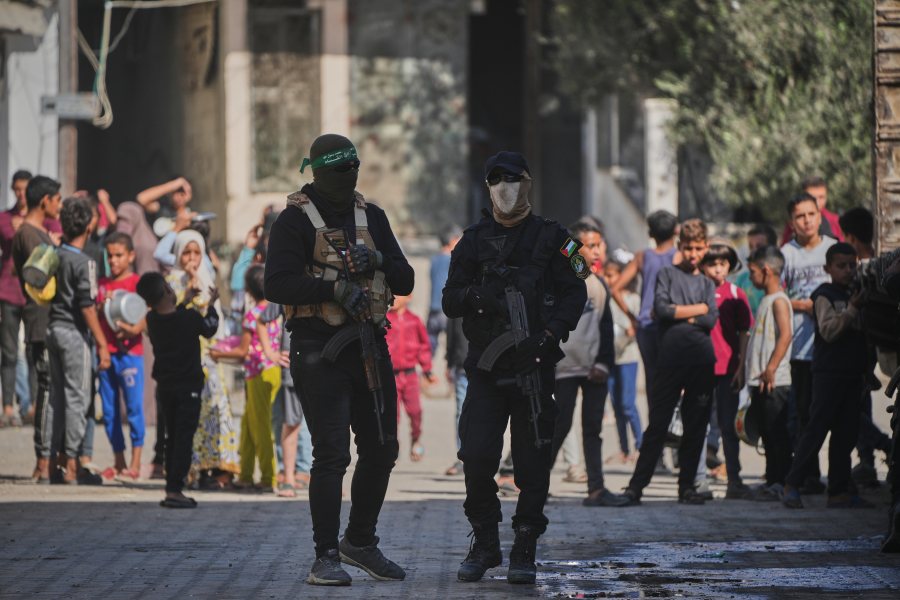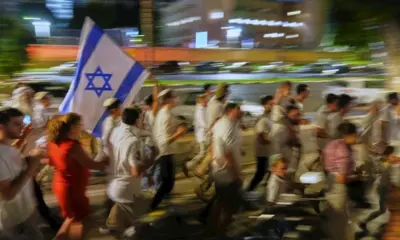World
Slow Return of Hostage Remains Threatens Gaza Ceasefire

The slow return of bodies of hostages held by Hamas poses a significant risk to the fragile ceasefire established in the ongoing conflict between Israel and Hamas. Following the announcement on Monday that Hamas had released the remains of one hostage, families of the missing are grappling with renewed grief as they await the recovery of their loved ones, whose bodies remain in Gaza.
More than two weeks into the ceasefire, which began on October 10, 2023, the uncertainty surrounding the fate of these remains is intensifying emotional distress. Many families are struggling to find closure, yearning for the bodies of their relatives to be returned for proper burial, a deeply ingrained cultural and religious practice in Israel.
Emotional Toll on Families
Orna Neutra, the mother of Omer Neutra, an Israeli-American soldier killed during a Hamas-led attack on October 7, 2023, expressed her longing for closure. “This is my son,” she stated in Tel Aviv. “We need that concreteness.” The family has been actively seeking answers, having made numerous trips to Washington to advocate for their son’s return.
Neutra’s family initially held out hope that he was alive for over a year following the attack. It was only after 14 months that they received intelligence indicating he had been killed. The slow pace of returning remains adds to their suffering, as they now face a new form of emotional anguish. “You crave this closure,” Orna Neutra said. “But we know that it’s going to also trigger grief that’s being held back from two years of fighting.”
The emotional strain is compounded by a recent statement from Israeli Prime Minister Benjamin Netanyahu, who directed the military to resume “powerful strikes” in Gaza. This development has raised concerns that the ceasefire may be jeopardized, particularly as Hamas indicated it would postpone the handover of additional remains.
Ceasefire Under Pressure
As part of the ceasefire agreement, Hamas released 20 living hostages and the remains of 15 deceased individuals. However, they have claimed that the retrieval of all remains is hindered by rubble from Israel’s offensive in Gaza. Israeli officials have accused Hamas of delaying the process and have threatened to resume military operations if all remains are not swiftly returned.
This week, Hamas announced an expanded search for the bodies, enlisting additional resources, including assistance from Egypt. The ongoing struggle for identification of returned bodies is a shared anguish among Palestinian families in Gaza, many of whom are also grappling with the loss of loved ones and the lack of information on their whereabouts.
According to the Gaza Health Ministry, many bodies returned appear to belong to fighters or individuals killed during the initial Hamas-led attack. Israel has returned 195 Palestinian bodies, but only 75 have been positively identified, causing further distress for families seeking to lay their loved ones to rest.
Dr. Einat Yehene, head of rehabilitation for the Hostages Families Forum, emphasizes the importance of connecting with the remains. “Some came back with clothing, while others were only bones or fragmented pieces. It’s very devastating,” she noted. This connection is crucial for families attempting to navigate their grief, as it provides a tangible sense of closure.
For many families, the expectation of immediate burial is rooted in both Jewish and Islamic traditions. In Judaism, a directive from Deuteronomy stresses the necessity of burial on the same day as death. The emotional weight of delayed burials has left families in a protracted state of mourning, unable to find peace without the physical presence of their loved ones.
Ronen Neutra, Omer’s father, expressed frustration at the lack of understanding from those outside Israel regarding the importance of remains. “A deceased hostage is still a hostage,” he said. “It’s part of our culture that we don’t leave anybody behind.” This sentiment echoes the broader Israeli societal commitment to honoring those who have served in the military.
The ongoing conflict and the emotional turmoil surrounding the return of bodies highlight the complexities of the situation in Gaza and Israel. Families on both sides of the conflict are navigating immense grief and uncertainty, underscoring the urgent need for resolution and reconciliation.
-

 Science2 weeks ago
Science2 weeks agoResearchers Challenge 200-Year-Old Physics Principle with Atomic Engines
-

 Politics2 weeks ago
Politics2 weeks agoNHP Foundation Secures Land for 158 Affordable Apartments in Denver
-

 World4 days ago
World4 days agoBoeing’s Aircraft Production: Assessing Numbers and Challenges
-

 Entertainment3 days ago
Entertainment3 days agoSyracuse Stage Delivers Lively Adaptation of ‘The 39 Steps’
-

 Lifestyle4 days ago
Lifestyle4 days agoRed Bluff High School’s Elli Nolan Named Rotary Student of the Month
-

 Health2 weeks ago
Health2 weeks agoNeuroscientist Advocates for Flag Football Until Age 14
-

 Lifestyle2 weeks ago
Lifestyle2 weeks agoLongtime Friends Face Heartbreak After Loss and Isolation
-

 Science3 days ago
Science3 days agoAI Misidentifies Doritos Bag as Gun, Triggers Police Response
-

 Business2 weeks ago
Business2 weeks agoSpirit Airlines Cuts Workforce with Furloughs for 365 Pilots
-

 World2 weeks ago
World2 weeks agoGlobal Military Spending: Air Forces Ranked by Budget and Capability
-

 Top Stories4 days ago
Top Stories4 days agoUrgent Search for Suspect Who Exposed Himself to Teen Girl
-

 Politics2 weeks ago
Politics2 weeks agoIsraeli Air Strikes in Lebanon Kill One, Wound Seven Amid Tensions









